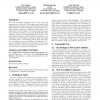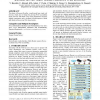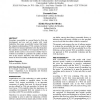HCI
2009
14 years 11 months ago
2009
This paper aims at contributing to the evaluation of web accessibility and thus promoting design for all, considering the design process as an iterative process containing evaluati...
125
click to vote
HCI
2009
14 years 11 months ago
2009
In this paper we present an accessibility analysis framework for the specification of Web accessibility evaluation scenarios that differentiates the requirements of users with disa...
127
click to vote
W4A
2010
ACM
14 years 12 months ago
2010
ACM
The Web accessibility discipline strives for the study and improvement of front-end Web design towards people with disabilities. Best practices such as WCAG dictate how Web pages ...
121
Voted
WWW
2010
ACM
15 years 12 days ago
2010
ACM
This demo will present HearSay, a multi-modal non-visual web browser, which aims to bridge the growing Web Accessibility divide between individuals with visual impairments and the...
IADIS
2003
15 years 3 months ago
2003
Recent developments in information and communication technology have set in motion a revolution within the Banking sector which has resulted in a new channel for banking services ...
DGO
2004
15 years 3 months ago
2004
The NSF-fundedi research described in this paper focuses on the development of automated software tools for improving Web accessibility for older adults. The Web offers great prom...
112
click to vote
INTERACT
2007
15 years 3 months ago
2007
Nowadays, accessibility is a crucial factor for Web site development and use, and yet, people with visual disabilities face many accessibility barriers that hinder the adequate un...
125
click to vote
ASSETS
2008
ACM
15 years 4 months ago
2008
ACM
Research projects, assistive technology, and individuals all create metadata in order to improve Web accessibility for visually impaired users. However, since these projects are d...
117
click to vote
ASSETS
2007
ACM
15 years 6 months ago
2007
ACM
Web browsing is inefficient for blind web users because of persistent accessibility problems, but the extent of these problems and their practical effects from the perspective of ...



